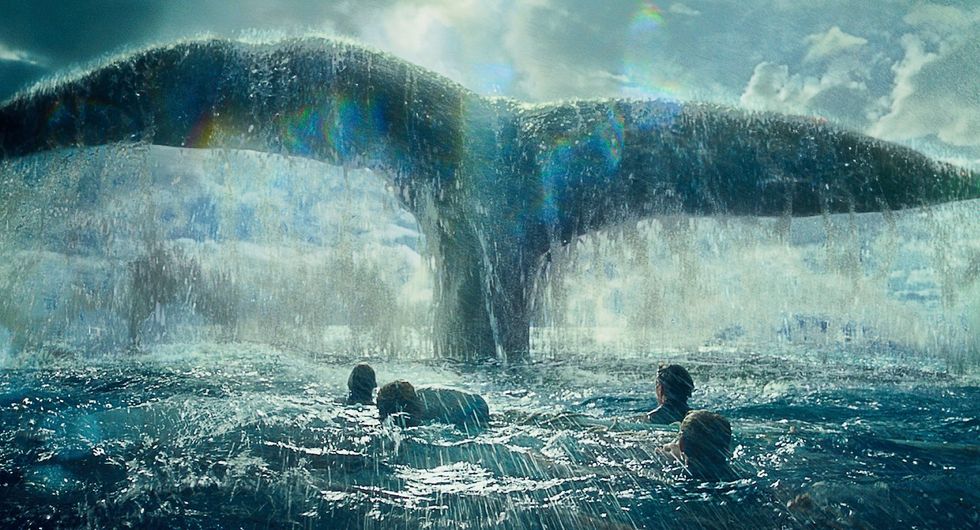
© 2024 Blaze Media LLC. All rights reserved.
The true story that inspired Herman Melville's "Moby Dick." How does the reality stack up to the fiction?
**The following is an in-depth review of “In the Heart of the Sea” and does contain spoilers.**
In 1850, Herman Melville sat down and wrote one of the greatest American epics of all time - "Moby-Dick."
While the story of Captain Ahab's obsession was mostly a work of fiction, the idea of a whaling ship being attacked by a whale of fantastic size was rooted in fact. "In the Heart of the Sea" is the story of the whaling ship Essex, the Nantucket vessel that served as the inspiration for Melville's classic.
The Essex set sail in 1819 for a two-and-a-half-year cruise in search of whale oil. The ship was under the command of Captain George Pollard, a blue blood from a long line of Nantucket sailors. The ship's first mate was Owen Chase, a man who had served on whaling ships since he was old enough to do so, and who felt that he had been unjustly passed over for a command he rightfully earned. This caused some animosity between Chase and Pollard.
The film begins in 1850, with Herman Melville visiting Thomas Nickerson, the "last surviving member" of the crew of the Essex, to get the story of the whale that destroyed the ship. This is actually historically inaccurate. Melville was inspired to write "Moby-Dick" after reading a book that Owen Chase had written of the incident, and in 1850 Thomas Nickerson was not the last surviving member of the ship's crew. Chase himself and Captain Pollard were both still living at the time Melville published "Moby-Dick."
The film builds up the idea of animosity between Chase and Pollard, but then doesn't really follow through with it. There is one good argument, where Pollard demands Chase's resignation, but after that any arguments or disagreements the men had were portrayed off-screen and merely mentioned either by crew or by the elder Nickerson, as he was relating the events to Melville. You never get to see the men at odds, and that does a disservice to the development of the characters.
The film also tends to drag in many areas. The Essex is sunk by the whale in the middle of the movie. Since that event wasn't the climax, you're left with the second half of the film dealing with the three lifeboats which carried the survivors floating around the ocean. The lifeboats were at sea for 90 days after the shipwreck, but not a lot happened during that time. The second half of the film mostly consists of watching the men float around and starve.
There is a brief time in the film where the men in Chase's boat find an island. They find some food and get some time out of the sun, but it doesn't take long for them to get back on the water where nothing interesting happens.
There are two other times after the sinking where Chase's boat comes across the whale that sunk them - identified by a large piece missing out of his tail fin - but again, nothing incredibly exciting happens. Chase is shown to briefly have an Ahab-like obsession with the whale, but nothing really comes of that either.
"In the Heart of the Sea" had a good premise, and it could have been a really interesting movie, but it seems to lack direction. Much of the time spent with the men floating around in life boats almost seems to exist to pad the film out to around two hours, but much of this padding wouldn't have been needed if they had spent more time developing the relationship and animosity between Chase and Pollard. The film fast-tracked getting to the whale attack, but then was left with not a lot of story left to tell.
The film also missed an opportunity in explaining the aftermath of the attack after their rescue. George Pollard was given command of two other vessels, both of which were also lost at sea. He was eventually seen as a pariah in the sailing community and no one would trust him with another command, forcing his retirement. Owen Chase suffered extreme PTSD later in his life and was plagued by dreams and hallucinations of the Essex, eventually leading to his institutionalization.
There was plenty of meat there for an interesting story, leading up to the attack and in its aftermath, but the film missed all of this potential. It watches much more like a History Channel film, and not a big budget theatrical. The audience would almost feel more comfortable watching at home, where they can get up and go to the kitchen during the boring bits. In the cinema, you're somewhat of a captive audience.
If the history of sea-faring vessels interests you, "In the Heart of the Sea" does tell the story of one of most interesting tales of the sea. If you're interested in the tale that inspired "Moby-Dick," again, this may satisfy that interest. It would, however, probably be best to wait until the film makes its way to Netflix or video that way you can enjoy it in the comfort of your own home and not be held captive in the theater.
–
TheBlaze contributor channel supports an open discourse on a range of views. The opinions expressed in this channel are solely those of each individual author.
Want to leave a tip?
We answer to you. Help keep our content free of advertisers and big tech censorship by leaving a tip today.
Want to join the conversation?
Already a subscriber?
more stories
Sign up for the Blaze newsletter
By signing up, you agree to our Privacy Policy and Terms of Use, and agree to receive content that may sometimes include advertisements. You may opt out at any time.
© 2024 Blaze Media LLC. All rights reserved.
Get the stories that matter most delivered directly to your inbox.
By signing up, you agree to our Privacy Policy and Terms of Use, and agree to receive content that may sometimes include advertisements. You may opt out at any time.



